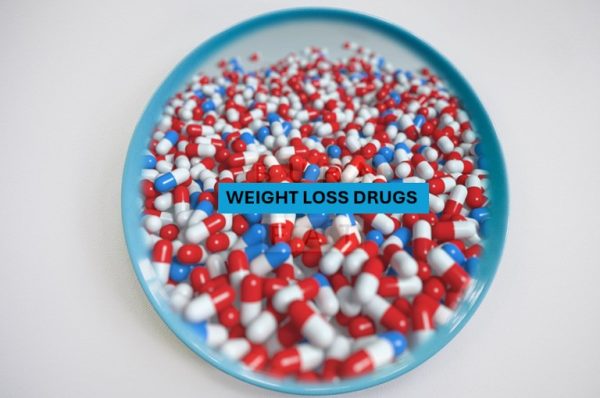
Understanding Impact Of Weight Loss Drugs
Weight loss drugs are medications designed to help people lose weight by either reducing appetite, increasing feelings of fullness, decreasing the absorption of fat, or boosting metabolism. They are prescribed when diet and exercise alone have not been sufficient for weight loss, or for individuals with obesity who have related health risks such as diabetes, hypertension, or heart disease.
Common types of weight loss drugs:
- Appetite suppressants (e.g., Phentermine, Liraglutide):
- These drugs work by affecting brain chemicals to help reduce the feeling of hunger or make you feel full sooner.
- Example: Phentermine is a stimulant like amphetamines and is used as a short-term treatment for obesity.
- Liraglutide (Saxenda) mimics a hormone that targets the brain to regulate appetite.
- Fat absorption inhibitors (e.g., Orlistat):
- These medications work by blocking a portion of the fat from being absorbed into the body.
- Orlistat (Alli, Xenical) inhibits the enzyme lipase, preventing the digestion of fats.
- GLP-1 Agonists (e.g., Semaglutide, Ozempic):
- These medications mimic the hormone GLP-1, which regulates appetite and blood sugar levels. They can also slow down the emptying of the stomach, making you feel full longer.
- Semaglutide (Wegovy, Ozempic) is an example that has gained attention for its effectiveness.
- Combination drugs:
- Some medications combine different mechanisms of action for better results. For example, Contrave combines bupropion (an antidepressant) and naltrexone (used to treat alcohol and opioid dependence) to reduce appetite and cravings.
Weight loss drugs can help reduce obesity and promote weight loss, but they are typically part of a comprehensive treatment plan that includes diet, exercise, and behavioral changes. These medications can be effective, especially for individuals who have struggled with losing weight through lifestyle changes alone, or those who have obesity-related health risks like type 2 diabetes, hypertension, or heart disease.
How weight loss drugs help reduce obesity:
- Promoting weight loss:
- Weight loss drugs can lead to a reduction in body weight, usually in the range of 5% to 10% of a person’s initial weight. This may not seem like a lot, but even modest weight loss can significantly improve health outcomes for people with obesity.
- Improving health conditions:
- Reducing weight through medication can lower the risk of obesity-related conditions, including:
- Type 2 diabetes
- Cardiovascular disease
- Sleep apnea
- High blood pressure
- Joint problems (due to less stress on joints)
- Reducing weight through medication can lower the risk of obesity-related conditions, including:
- Supporting long-term weight management:
- While lifestyle changes like diet and exercise are the foundation of weight loss, medications can provide additional support by helping control hunger, reduce cravings, or increase metabolism. Some drugs, such as GLP-1 agonists (e.g., Semaglutide), can help people feel fuller longer, making it easier to stick to calorie-restricted diets.
- Improved metabolic health:
- Weight loss can lead to better blood pressure, blood sugar control, and cholesterol levels, reducing the risk of conditions like type 2 diabetes, cardiovascular disease, and sleep apnea.
- Increasing motivation:
- Seeing weight loss results with medication can motivate individuals to continue with lifestyle changes, as they may experience quicker initial results compared to diet and exercise alone.
Limitations of weight loss drugs:
- Modest weight loss:
- Weight loss drugs result in moderate weight loss. They are not a “magic bullet” and typically help lose 5-10% of body weight, which might not fully address severe obesity in some cases. However, even modest weight loss can have significant health benefits.
- Side effects:
- Weight loss medications can have side effects, such as nausea, diarrhea, constipation, headaches, and increased heart rate. Some drugs may also have more severe risks, including mental health impacts or interactions with other medications.
- Common side effects may include nausea, constipation, diarrhea, headache, dry mouth, and insomnia.
- More serious risks include increased heart rate, high blood pressure, or mental health effects like depression or anxiety.
- Not a cure for obesity:
- Medications alone are not a cure for obesity. Once the medication is stopped, many individuals may regain weight if they do not maintain lifestyle changes. Continued use or a long-term strategy is often required to sustain weight loss.
- Individual response:
- Not everyone responds to weight loss medications the same way. Some people may experience more significant weight loss than others, and some may have more side effects. Doctors typically assess how well a drug is working after a few months and may adjust the treatment plan.
Long-term considerations: Some weight loss medications are approved for long-term use (e.g., Orlistat, Liraglutide), while others, like Phentermine, are approved only for short-term use due to their potential for abuse or adverse effects. The long-term safety and effectiveness of newer drugs like Semaglutide are still being evaluated.
Weight loss drugs can be effective in helping individuals lose weight and reduce obesity, particularly when combined with healthy eating and regular exercise. They are especially helpful for those who have struggled with weight loss or have health conditions related to obesity. However, they are most effective as part of a comprehensive treatment plan and should be used under medical supervision.
Image credit: Image by Total Shape from Pixabay (Free to use under Pixabay content license)
References:
- https://obesitymedicine.org/blog/weight-loss-medications/https://www.uchealth.org/today/wegovy-vs-ozempic-the-truth-about-new-weight-loss-drugs/
- https://www.fda.gov/news-events/press-announcements/fda-approves-new-medication-chronic-weight-management
Author: Sumana Rao | Posted on: October 15, 2024
« Importance Of VO2 Max For Cardiovascular Health And How To Improve It? Zomato Receives Backlash Over Analogue Paneer – Know About Analogue Paneer »






















Write a comment